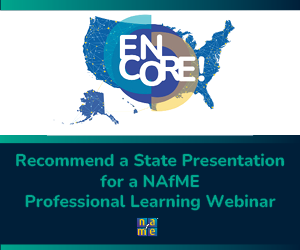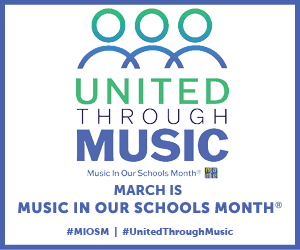/ News Posts / Guitar Class in the Grand Canyon State
Guitar Class in 50 States
Number 5: The Grand Canyon State
By Thomas Amoriello Jr.
NAfME Council for Guitar Education Chair
The guitar is now a fixture in many school music programs across the United States. During the last year in “Music in a Minuet,” we have visited guitar educators in New Jersey, Nevada, Minnesota, and Rhode Island. Today we visit Arizona with Dr. Ricardo Paz who is the guitar program Director at Phoenix Elementary School District #1 and founder of the Herrera Panther Guitar Ensemble. In 2015, he developed and hosted the first Phoenix District Guitar Festival, where students ranging from elementary school to graduate school performed for the community. His students at Magnet Traditional School receive a “genuine middle school, high-quality guitar experience training with the skills necessary to take guitar study to the high school level.” Magnet guitar students participate in numerous performances throughout the year.
Born in Mexico City, Dr. Paz started studying guitar at a young age in his native Mexico with Luis Robert and the Argentinian concert guitarist Manuel López Ramos. He studied at the National School of Music of the National Autonomous University of Mexico where he obtained a Bachelor of Music Degree under the guidance of Juan Carlos Laguna. He also earned a M.M. and D.M.A. in Guitar Performance from Arizona State University where internationally acclaimed guitar professor Frank Koonce stated that, “Dr. Ricardo Paz is an acclaimed artist and fine musician.”
In addition to his career as an educator, Dr. Paz has performed throughout Mexico and the United States, including Weber State University, University of Utah, Brigham Young University, Utah State University, and Springville Museum of Art in Utah, among others. Dr. Paz has appeared on National Public Radio in the United States. Dr. Paz has also been an adjudicator for the prestigious Guitar Foundation of America symposiums in both Phoenix and Las Vegas in the college categories.
Ricardo has resided in Tempe, Arizona, since 2007 with his wife, Fanny, and his son, Leonardo.
Please tell us about your school and overall music program.
I have developed a successful classical guitar programs at both Silvestre Herrera and Magnet Traditional middle schools in the Phoenix Elementary School District since 2014.
The classical guitar program provides a genuine middle school, high-quality guitar experience training with the skills necessary to take guitar study to high school level. It has grown so rapidly that under my direction the guitar program is currently being offered in three more schools within the school district.
Our guitar students have had workshops and masterclasses with worldwide artists and educators such as Matthew Denman, Director of Education for the Guitar Foundation of America & Director of the Celedonio Romero Guitar Institute; the renowned Swedish classical guitarist Johannes Moller; and Matthew Hinsley, Director of the Austin Classical Guitar Society. They have also performed at the 2015, 2016, and 2017 Phoenix District Guitar Festivals. In 2016, they received a superior perfect rating at the 2nd Annual Guitar Ensemble Festival at ASU.
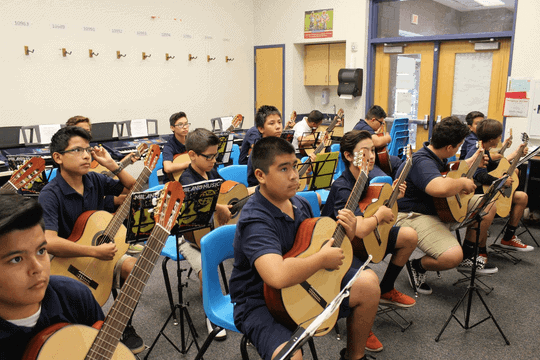
Please tell us about your own personal musical background growing up and your collegiate experience.
I started studying classical guitar at a young age in my native Mexico with Luis Robert and the Argentinian concert guitarist Manuel López Ramos. I studied at the National School of Music of the National Autonomous University of Mexico where I obtained a Bachelor of Music Degree in Guitar Performance. I hold a M.M. and D.M.A. in Guitar Performance from Arizona State University where I studied with the internationally acclaimed guitar professor Frank Koonce.
I have been the recipient of numerous international awards, such as the Special Talent Award, Louis Lincoln Kerr Music Endowment, Richard & Babette Burns Scholarship, and K. Herberger Scholarship from Arizona State University. I also won the prestigious Mexican National Fund for Culture and Arts scholarship for post-graduate studies abroad on two occasions.
I have performed throughout Mexico and the United States, including Weber State University, University of Utah, Brigham Young University, Utah State University, and Springville Museum of Art in Utah, among others. I have appeared on National Public Radio in the United States, and I have also been an adjudicator for the prestigious Guitar Foundation of America symposiums in both Phoenix and Las Vegas in the college categories.
How do the guitar family instruments fit into your teaching?
My teaching includes only classical guitar to middle school students, so the guitar fits extremely well all the time.
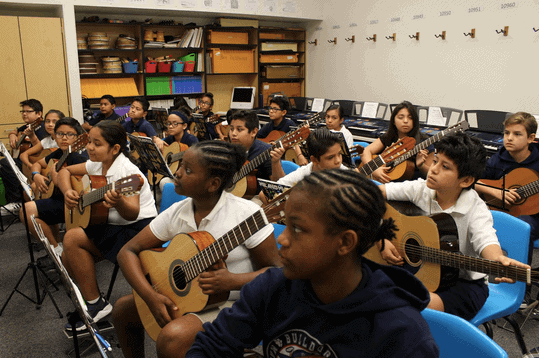
What obstacles did you face when you were first hired at your school?
None. Since the beginning of my contract, my principal knew about my guitar expertise, and he supported all my ideas and goals.
What kind of classes related to the guitar do you teach?
I teach guitar history, harmony, guitar pedagogy, solfege, and guitar technique.
What would you like to say to the non-guitarist music educator who is about to or interested in incorporating the guitar into their program?
In fact, I convinced my music colleagues at the Phoenix District to incorporate guitar into their music programs. We had professional development meetings where I offered them guitar instruction. As a result of that, they started guitar clubs at their schools. You do not need to be a guitarist; you need to provide students a different path to explore music.
Do you have any success stories you would like to share about students (musical & non-musical)?
My guitar students were so excited when they received a superior perfect rating at the 2nd Annual Guitar Ensemble Festival at Arizona State University in 2016. Many of them continue studying classical guitar in the best high school guitar programs in Arizona. They plan on majoring in classical guitar performance.
What do you tell your talented students who are planning to pursue music or guitar studies in high school, college after they finish with you?
I let my students know which high schools and universities have the best guitar programs, not only in the States, but around the world as well. I have helped them prepare for their auditions, find scholarships, interact with renowned guitarists through guitar festivals, and write letters of recommendation as part of the school’s admission requirements.
Do you have any networking or advocacy tools that have worked for you promoting your program that would help other educators?
The best way to promote your guitar program is with your own guitar students. They need to play constantly in many venues, so people know them and can spread the word among their friends and community. Having a professional website for the guitar program is a great tool—and Facebook as well.
What kind of future do you see for guitar in music education in the school system?
It depends on the passion and energy from the guitar educators to advocate for the classical guitar in the school system. For the guitarists, the lack of guitar-specific teacher training and certification means less opportunity for the graduate to work in their music field. As a consequence of that, the profession suffers as well. This situation must be addressed by university professors if we can adjust part of our programs to a new idea for guitarists: teaching K-12 music in schools.
What type of arrangements and/or transcribing have you done for your school performances?
I have made all kinds of guitar arrangements for trios, quartets, and large ensembles.
Do you do any musical performance or activities outside of your public school teaching duties?
As a performer, I keep playing at many important festivals and venues throughout the United States and Mexico.
Any last thoughts to conclude our interview?
I truly believe classical guitar programs at schools are a great solution to avoid the typical curriculum that includes band, orchestra, and chorus. The most compelling reason for schools to offer guitar instruction is because the guitar is extremely popular among adolescents.
About the author:
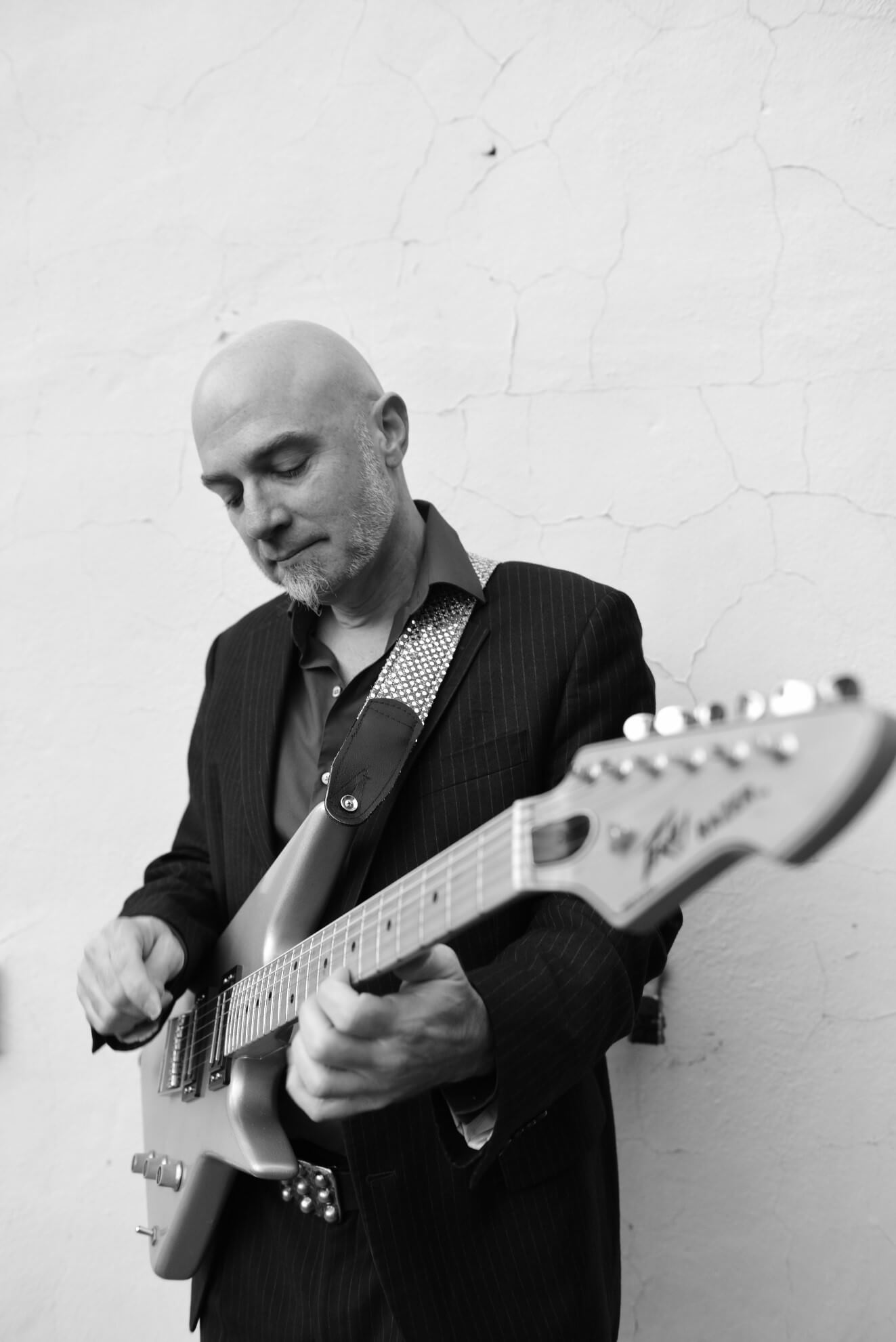 Thomas Amoriello is the NAfME Council for Guitar Education Chair and also serves as the Guitar Education Chairperson for the New Jersey Music Education Association. He teaches guitar for the Flemington Raritan School District and Hunterdon Academy of the Arts. Tom graduated from Shenandoah Conservatory with a Master of Music Degree in Classical Guitar Performance. He is the author of the children’s picture books; A Journey to Guitarland with Maestro Armadillo & Ukulele Sam Strums in the Sand, both available from Black Rose Writing. He recently made two vinyl record releases on the H42 Records label of Hamburg, Germany featuring former members of Black Sabbath, Whitesnake, Dio, Ozzy Osbourne, Yngwie J. Malmsteen’s Rising Force and more.
Thomas Amoriello is the NAfME Council for Guitar Education Chair and also serves as the Guitar Education Chairperson for the New Jersey Music Education Association. He teaches guitar for the Flemington Raritan School District and Hunterdon Academy of the Arts. Tom graduated from Shenandoah Conservatory with a Master of Music Degree in Classical Guitar Performance. He is the author of the children’s picture books; A Journey to Guitarland with Maestro Armadillo & Ukulele Sam Strums in the Sand, both available from Black Rose Writing. He recently made two vinyl record releases on the H42 Records label of Hamburg, Germany featuring former members of Black Sabbath, Whitesnake, Dio, Ozzy Osbourne, Yngwie J. Malmsteen’s Rising Force and more.
Published Date
August 1, 2018
Category
- Ensembles
Copyright
August 1, 2018. © National Association for Music Education (NAfME.org)

